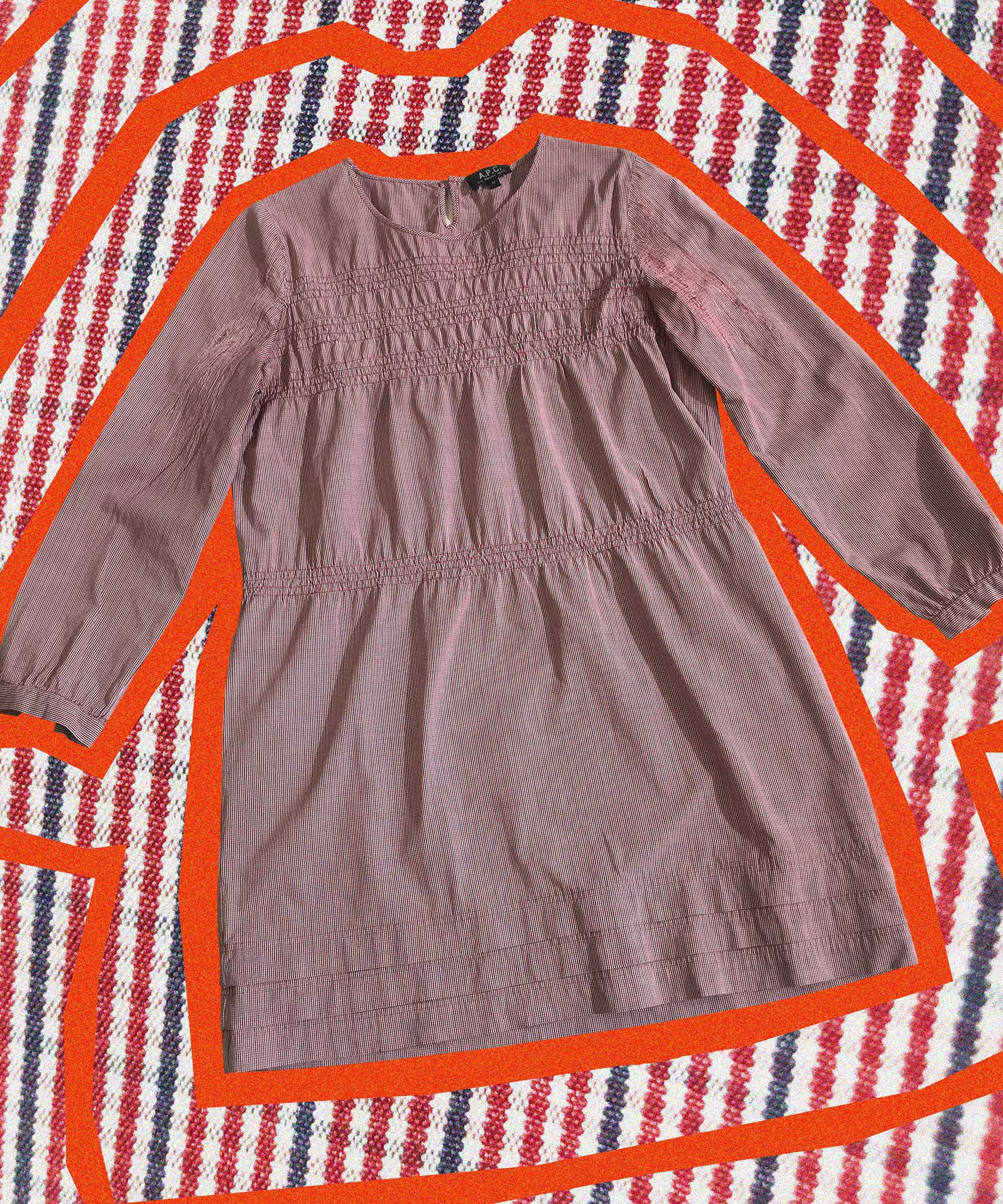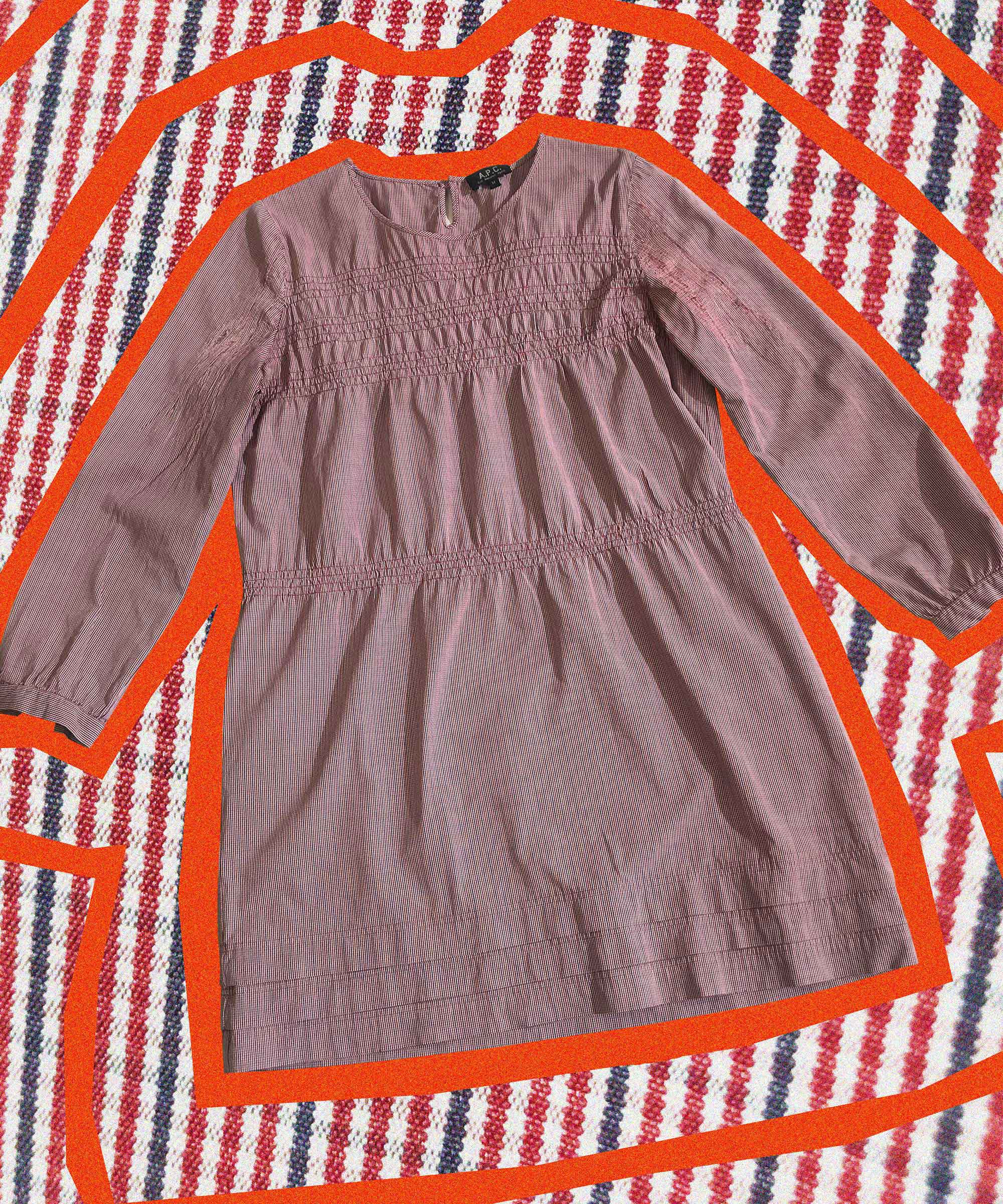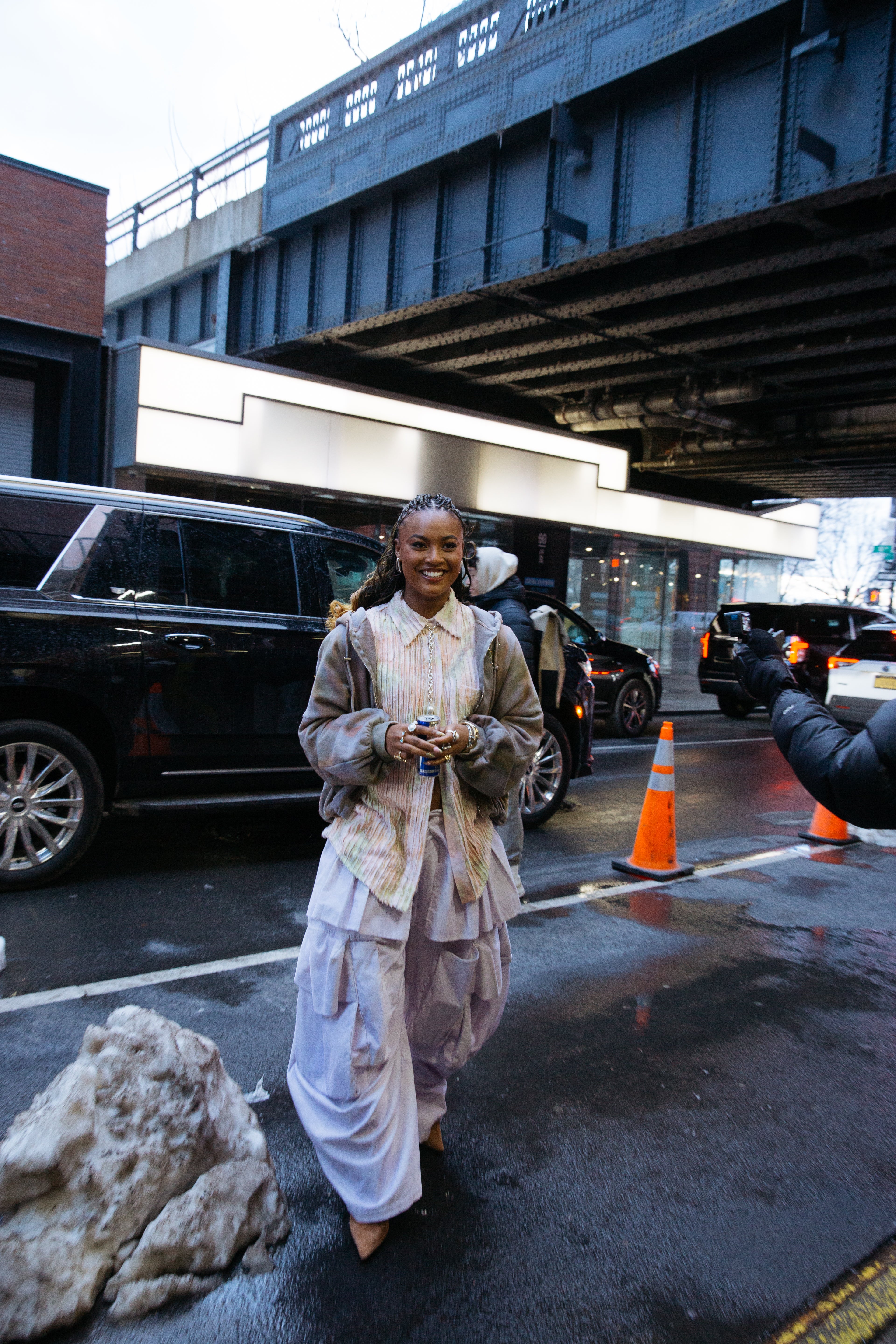

The owner of my local dry cleaners gives me that look again. Then, she shakes her head and sighs. We’ve been here before; the long pause, the disapproval — I know it well. It began the second time I came in for a small patch job on my favorite dress: a long-sleeve, short, cotton masterpiece I bought in 2012. But this was different. I had returned for the fifth time, and with a new tear near the shoulder that was a wee bit longer than the ones before. (It is always at this moment I regret quitting my 4H Sewing Group, before I finished that poncho.) My tailor urges me to let go, to move on, to throw it away. But the rest of the dress is in perfect condition: There are no stains, no hem giving way. If Marie Kondo was there to witness our exchange, she might have asked, “Does the dress spark joy?” I’d tell Marie: “It fucking slaps.” Finally, the owner looks back at me, back at the dress, and then at me again. She takes the thin piece of red tape and lays it over the imperfection. She tells me to come back Friday evening. The dress will live.
I never play this game with my cobbler, who does a yearly tune-up on my Prada riding boots, and we’re going on year seven. Nor do I get that look when I have my ancient Burberry tote bag’s leather handles replaced. But, at least with this tailor, extending the lifespan of my dress seems to push the acceptable boundaries of fashion repair.

So, what is this object of affection that I can’t quit? It’s an A.P.C. cotton dress bought for fifty dollars at a hectic sample sale in Brooklyn nearly a decade ago. I bought three A.P.C. dresses that afternoon. I still wear them, too, but only the favorite needs the extra work, a result of its heavy rotation in my wardrobe. The cut of the dress, the spot where the hem falls on my leg, works well with my frame. The dress goes from winter to spring to summer with uncanny ease. Its tight pattern of red, white, and brown vertical stripes is almost, but not quite, an intricate gingham. Its flattering jewel neckline with a single button in the back, long sleeves with a subtle puff at the shoulder, and three horizontal pleats that cascade toward the hem show just the right amount of leg. And the piece de resistance? Its unexpected smocking, up across the bodice and around the waist that renders it classic bohemian chic, impervious to trends or fads. It pairs well with hoop earrings, a jean jacket, cardigan, or peacoat. And it has pockets.
When I first bought the dress I was a mother with three young children attempting to get my groove back. I wore it to playdates, potlucks, and parent-teacher conferences. And then I wore it to the offices of divorce lawyers. And later on, to an exceptionally excellent fourth date. I had a limited, nearly non-existent clothes budget, and had to make everything work, really work, season after season. I began to evolve with the dress, learning how to accessorize to keep it playful, or sexy, or both. I styled it with black tights, or better still, black knee-highs with clogs, or boots, or bare-legged with a pair of sandals. I loved the feeling of a bit of thigh showing, and I learned that what a frock reveals is just as important as what it covers up. The dress taught me how to dress.
The dress changed the way I shopped. Now, I look for flexible fortitude in every piece of clothing. Sure, I have seasonal favorites, a fisherman sweater bought in Canada, or vintage Lilly Pulitzer dresses, sometimes worn ironically. But when I think of my dress, I feel I’m finally fashion literate. And because I couldn’t figure out what work-from-home-wear was, my habit of buying things in a hurry, because things were cheap, or because I saw them on someone else, left me with a hodge-podge of garments and decision fatigue. These are the consequences of living in an era of easy access to fast fashion. It made the art of curating the personal capsule collection a choice, a skill, and not a necessity.

And for every friend that says, “Oh you’re wearing that again?” there is someone else, a stranger, who approaches me to tell me, “I love your dress.” I am far from alone in seeing its beauty. So those rips that require mending, comments from friends, the judgy look from my tailor are a small price to pay for that feeling of being put together even when, at times, my life was a mess, and I wasn’t sure if I would feel attractive again. After kids, and after leaving my marriage, the dress gave me that feeling back.
While it has become my go-to look, it is not to be confused with a uniform. When I think of uniforms, I think of Steve Job’s awful black turtleneck — or Theranos’ Elizabeth Holmes. They both claimed that wearing the same outfit every day saved them time. I enjoy thinking about what I am going to wear, though. I also don’t wear it every day, but I’d be lying if that Reductress piece titled How To Save Money By Wearing One Signature Look Like a Cartoon Character didn’t make me both laugh and feel a bit uneasy. I’ve surrendered to the fact that the short dress is my trademark. Jackie O had her sunglasses and K Jacques sandals, and Maggie Rogers has her bell-bottoms. I wear the dress because it brings me joy. And if I squint a bit, I can even pretend to have a certain je ne sais quoi like cookbook author Mimi Thorisson, whose popular blog Manger and accompanying Instagram account have enchanted hundreds of thousands of followers for years with her recipes and aspirational lifestyle. She chronicled her glorious days donning A.P.C. dresses that she often paired with Hunter rain boots — another look I adore. I eventually had to stop following her on Instagram due to the overwhelming perfection of her French chateau life, but my longing for her lifestyle lingers.
I remember being surprised when, as a teenage exchange student to Finland, I saw fellow students wear the same outfits multiple times during the same week. They wore the same few pieces from local brand Marimekko, another label that wears like iron, over and over again. Their talents were lost on me then. And it was the opposite of how kids dressed back in my American high school, where we were poorer versions of Clueless’ Cher. It was part of the social contract. Our elegant high school French teacher, Madame Gilbert, once spent an entire class trying to explain how our European counterparts wore few pieces over and over again developing their look. Back then, I remember wearing so many outfits; many I didn’t love, that didn’t flatter me, or that I snatched damp from the dryer, all in an effort for variety. I used to do this as an adult as well.
Does compulsive consumption win over a well-curated wardrobe? The latter is harder to pull off as one has to have a keenly developed sense of style, materials, fibers, and cuts to put together an environmentally friendly personal collection. But thanks to necessity, and the dress, I finally learned this skill in the crucible of my post-divorce life.
The design name and acronym A.P.C. is for “Atelier de Production et de Création.” Founded over three decades ago by Jean Touitou, A.P.C. first arrived on the scene with raw denim jeans and quickly moved to designing a women’s collection. There’s something almost stoic about Touitou, and by extension, A.P.C.’s philosophy, with its quiet quest for perfection and timelessness. And while I cannot say their price points are accessible (I wouldn’t own my A.P.C. dresses without that sample sale), they aren’t as expensive as other competing labels, and the cost-benefit ratio is excellent.
I wish I could say that sustainability was the reason that my Instagram grid feed is a years-long pictorial journey of my dress and me. I’d love to say I wear and mend it because, as the planet barrels toward the point of no return in terms of climate change, I’m keeping it from a landfill. But perhaps being on-point is inextricably linked with finding a few pieces that last for years. In truth, the dress was a lucky accident. It was the right dress at the right time. And it miraculously brought me back to that feeling of being at home in my skin. I hope everyone has that frock they can’t quit — and a tailor that won’t quit, either.

Like what you see? How about some more R29 goodness, right here?
In Lockdown Our Wardrobes Hold Powerful Memories




